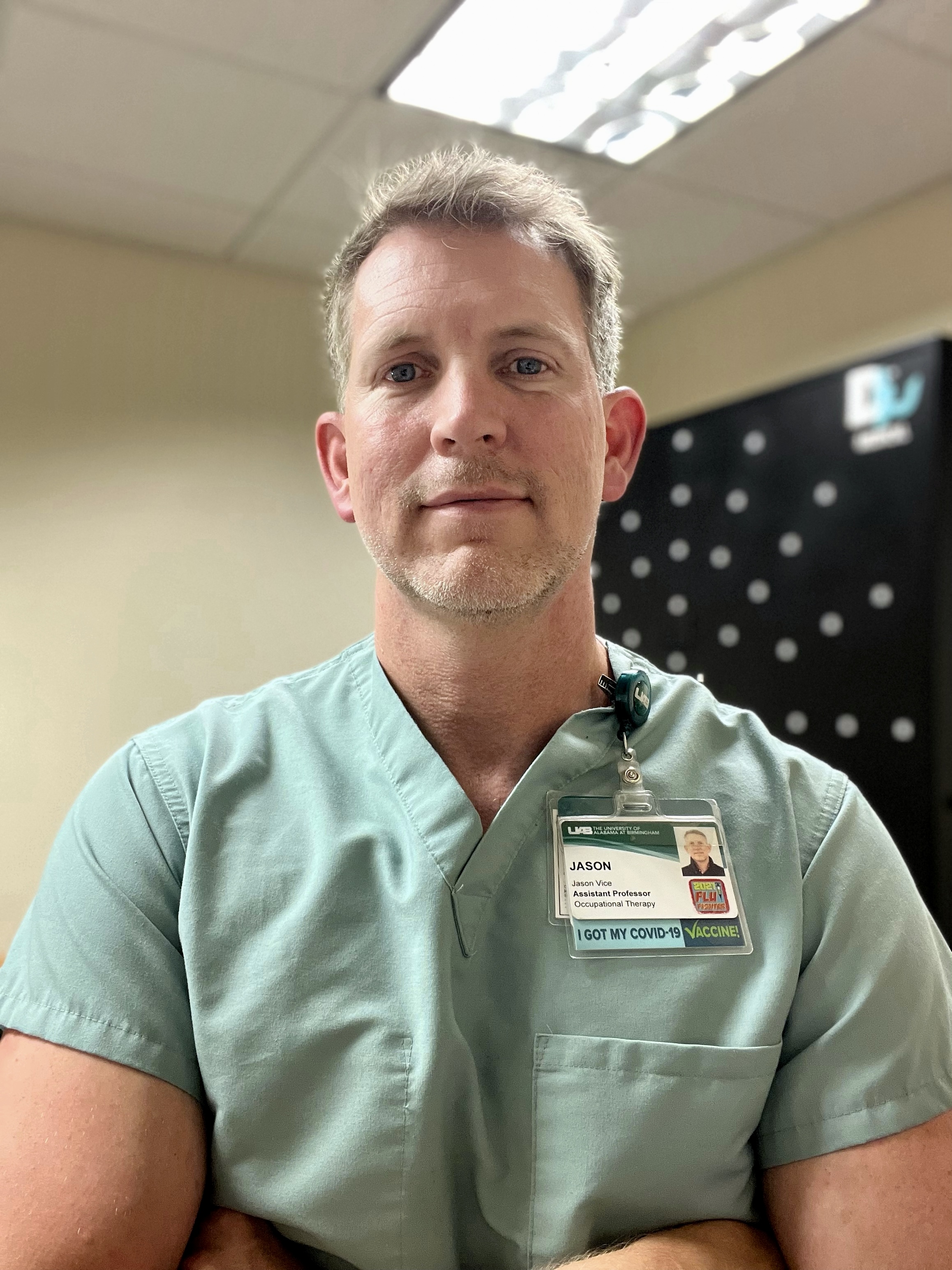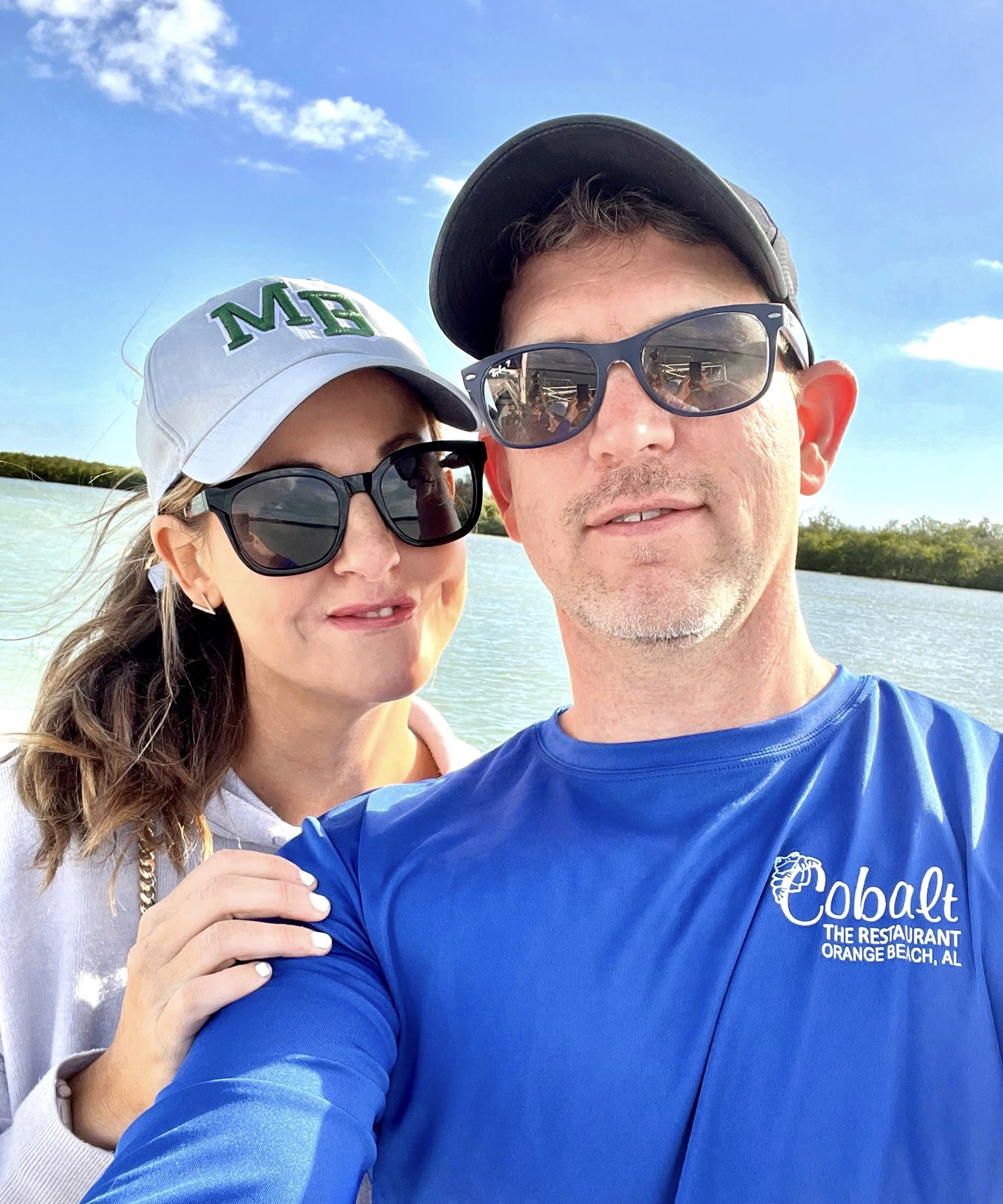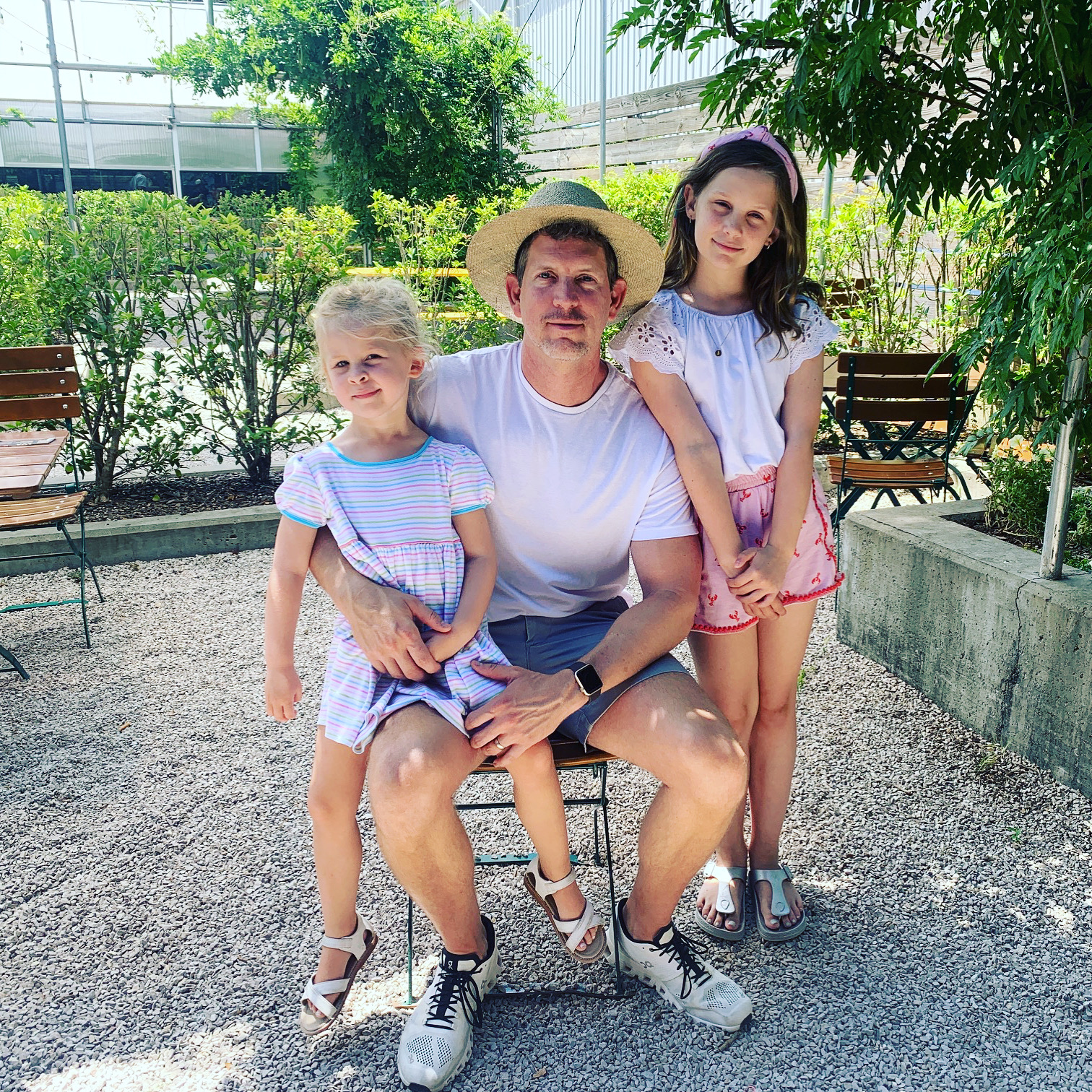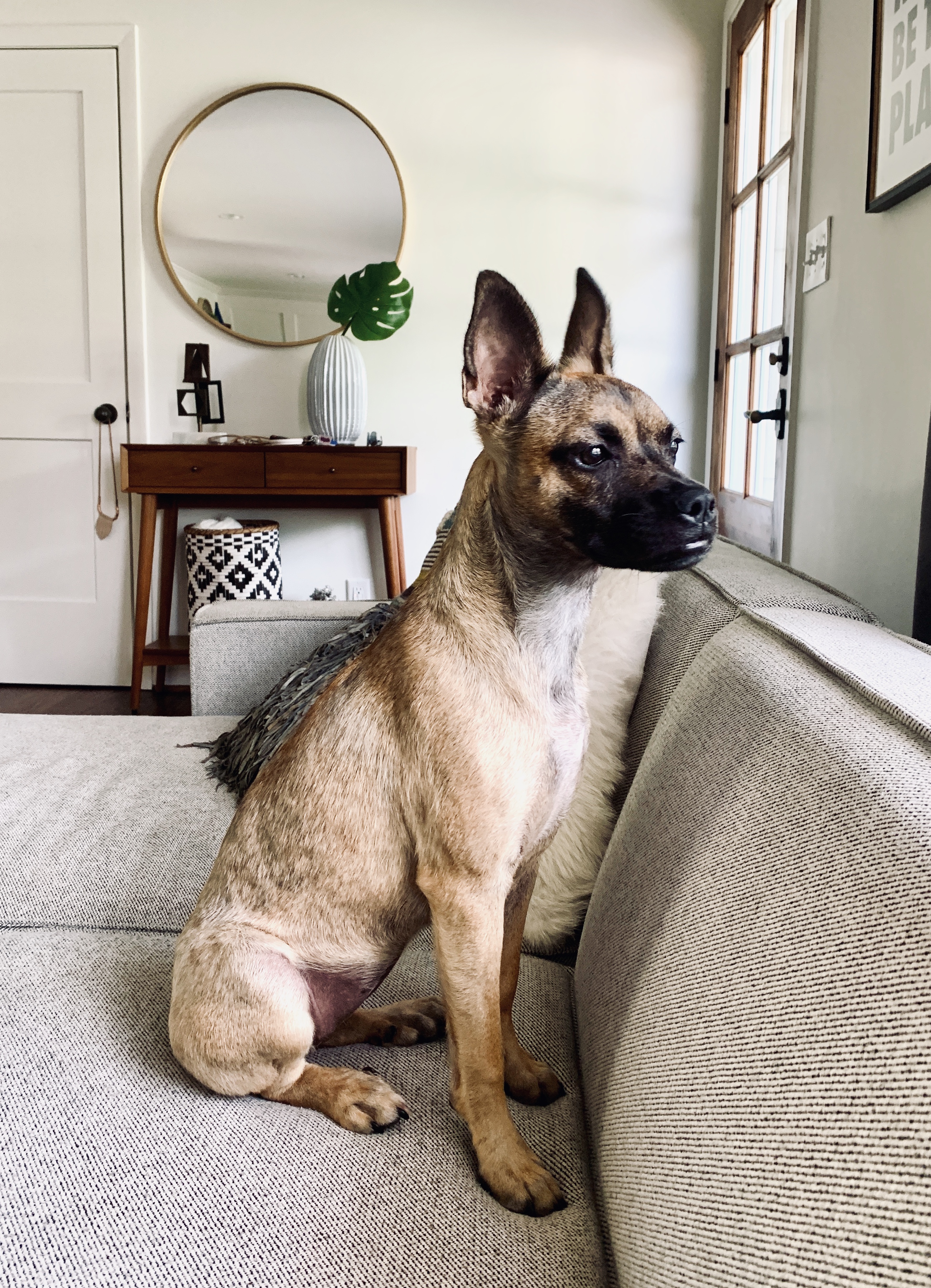 Jason Vice, PhD, OTR/L, SCLV Jason Vice, PhD, OTR/L, SCLV, assistant professor of occupational therapy, stays busy with a trio of professional responsibilities. In addition to teaching three courses and conducting vision science research, he is one of a handful of occupational therapists (OTs) in Alabama with a dedicated clinical practice focused on low vision care.
Jason Vice, PhD, OTR/L, SCLV Jason Vice, PhD, OTR/L, SCLV, assistant professor of occupational therapy, stays busy with a trio of professional responsibilities. In addition to teaching three courses and conducting vision science research, he is one of a handful of occupational therapists (OTs) in Alabama with a dedicated clinical practice focused on low vision care.
Dr. Vice is based at the multidisciplinary UAB Center for Low Vision Rehabilitation, where he provides care for children and adults with visual impairments and diseases. His work centers on training his patients to use specialized techniques, alternative practices, and assistive technology to help compensate for their vision loss.
Sometimes, he visits patients’ homes to recommend environmental modifications that can make their living spaces safer and more visually accessible. He’s also the only specialist in Alabama to provide initial training in the use of bioptic telescopes for people with low vision. This device, which attaches to standard eyeglasses, sharpens their visual clarity.
“These patients are not legally able to drive,” Dr. Vice says. “I teach them how to use the telescope to compensate for their vision loss. If we can demonstrate that they can safely compensate for their visual field defects, and they can pass on-road examinations, they can legally drive.”
His aim in all his care is to help individuals with low vision participate in the everyday pursuits they value most. “These patients have been told by repeatedly by their doctors how much vision they’ve lost, which can leave them feeling hopeless about their situation,” he says.
Dr. Vice and his colleagues at the center help them consider things differently. “What we’re really intentional about, particularly from an occupational therapy perspective, is talking upfront about how much vision they have left and how they can learn to use it in a different way. This can shift their thinking in a positive direction.”
With Dr. Vice’s deep engagement in and commitment to the world of occupational therapy, it may be a surprise to learn that it was not his first profession.
Life’s work found in second career
Dr. Vice began his professional life in marketing. He was on business trip in Miami when he learned that his father, who was then living independently in a Birmingham suburb, had experienced a stroke.
“I’d been married for a week and had just returned from my honeymoon when it happened,” Dr. Vice says. “I came home to tend to my father and to help him get through the rehabilitation process.”
Occupational therapy helped his father recover, and Dr. Vice was struck by how much it meant to him to be able to do simple, everyday activities.
“Most people, they want to walk independently, but he was just so proud that he could tie his shoes and dress himself. That was really meaningful to me. And I was interested in in a career change,” he says.
 Dr. Vice and his wife, Claire. Dr. Vice and his wife had made their home in Birmingham, and he completed his needed OT prerequisites at UAB. He applied for and was admitted to its master’s degree in occupational therapy program, where he soon discovered a love for low vison care.
Dr. Vice and his wife, Claire. Dr. Vice and his wife had made their home in Birmingham, and he completed his needed OT prerequisites at UAB. He applied for and was admitted to its master’s degree in occupational therapy program, where he soon discovered a love for low vison care.
“The entry-level low vision course intrigued me, and I was very inspired by Beth Barstow and Mary Warren,” he says.
Dr. Barstow, associate professor and director of the Graduate Certificate in Low Vision Rehabilitation Program, and Dr. Warren, who founded the program and was its director until her retirement in 2018, became Dr. Vice’s mentors. They tutored him in advanced low vision topics, provided opportunities to gain teaching experience, and advised him on managing the clinical position at UAB’s low vision center that he took after graduating.
Dr. Vice is now taking his turn as an educator and a mentor. His primary goal as a teacher is to help his students understand why their current coursework matters to their future work as OTs.
“It’s also important that they can synthesize that information. I want to ensure they’re flexible enough in their thinking to understand how something they may have learned weeks ago is related to what they’re currently learning,” he says.
He also wants his students to know that he’s accessible to them.
“I know from the outside it may look like I have 80 different things going on, but my students are always my top priority,” he says. “I want them to know I see them as real people, and that I appreciate their dedication to learning.”
Research aimed at improving low vision care
 Dr. Vice with his daughters, Stella and Vivian. Dr. Vice, who completed his PhD in vision science in December 2022, is also focused on expanding his knowledge. His research is aimed at bringing hard data to the clinical decision-making process in the use of eccentric viewing training, a technique used to improve sight in people with impaired central vision.
Dr. Vice with his daughters, Stella and Vivian. Dr. Vice, who completed his PhD in vision science in December 2022, is also focused on expanding his knowledge. His research is aimed at bringing hard data to the clinical decision-making process in the use of eccentric viewing training, a technique used to improve sight in people with impaired central vision.
“Everything these patients try to focus on is blurry, but their peripheral vision is normal,” he says. “Some people learn how to alter the direction of their gaze to move the bad spots out of the way. And some of them, for reasons we don’t understand, get really good at it. My research looks at how we can train these individuals to use eccentric viewing techniques so they can make those changes more effectively.”
Eccentric vision training is not new, but, currently, therapists must use their judgment rather than quantitative measurements to decide if the therapy is effective in individual patients. This means therapists may decide to stop training too early in people who might benefit if they continued for just a few more sessions.
Dr. Vice hopes to bring quantifiable data to this decision-making process. He is studying a computer-based system called gaze-contingent eye tracking that quantitatively measures a person’s eye movements, how well they can hold their eye in one position, and whether those skills are improving over time.
“Our goal is to use that information to make evidence-based recommendations for clinical changes that will improve the real-world delivery of care for patients with a central vision impairment,” he says.
Downtime is family time
 Tana, a Belgian Malinois-terrier mix, makes it her business to know what her people are doing. In between his teaching, research, and clinical practice, Dr. Vice enjoys spending time with his wife Claire, their daughters, Stella, 10, and Vivian, 4, and their dog, Tana.
Tana, a Belgian Malinois-terrier mix, makes it her business to know what her people are doing. In between his teaching, research, and clinical practice, Dr. Vice enjoys spending time with his wife Claire, their daughters, Stella, 10, and Vivian, 4, and their dog, Tana.
“We like to get out and do things together, walk, visit the Botanical Garden,” says Dr. Vice, who also enjoys Birmingham’s music scene.
Tana, a Belgian Malinois-terrier mix the family adopted from the Birmingham Humane Society just before the pandemic lockdown in 2020, loves spending time with her human family. “She’s a lot of fun, and she has some funny habits,” he says.
Tana worries when a family member is absent. “She checks in all the rooms to see what’s going on and won’t eat until everyone is home,” Dr. Vice says. “She just loves for all of us to be together.”
Original profile posted June 2022. Updated in 2023 to reflect Dr. Vice earning his PhD.